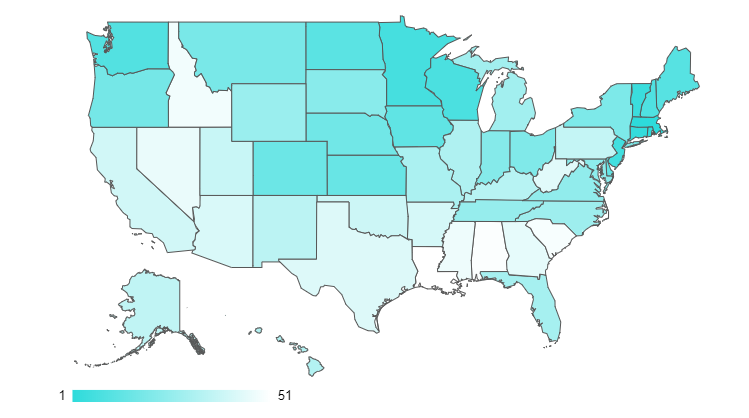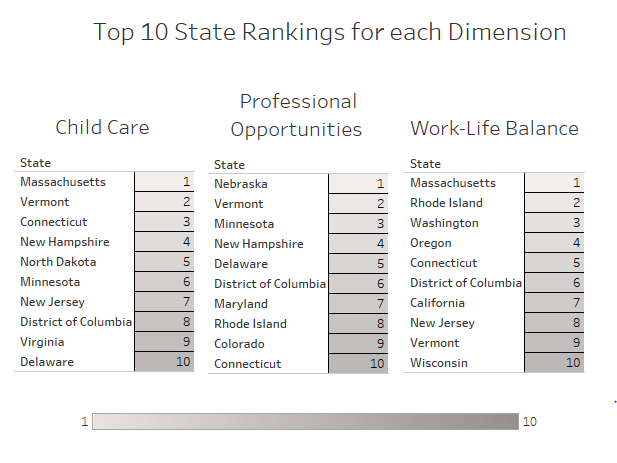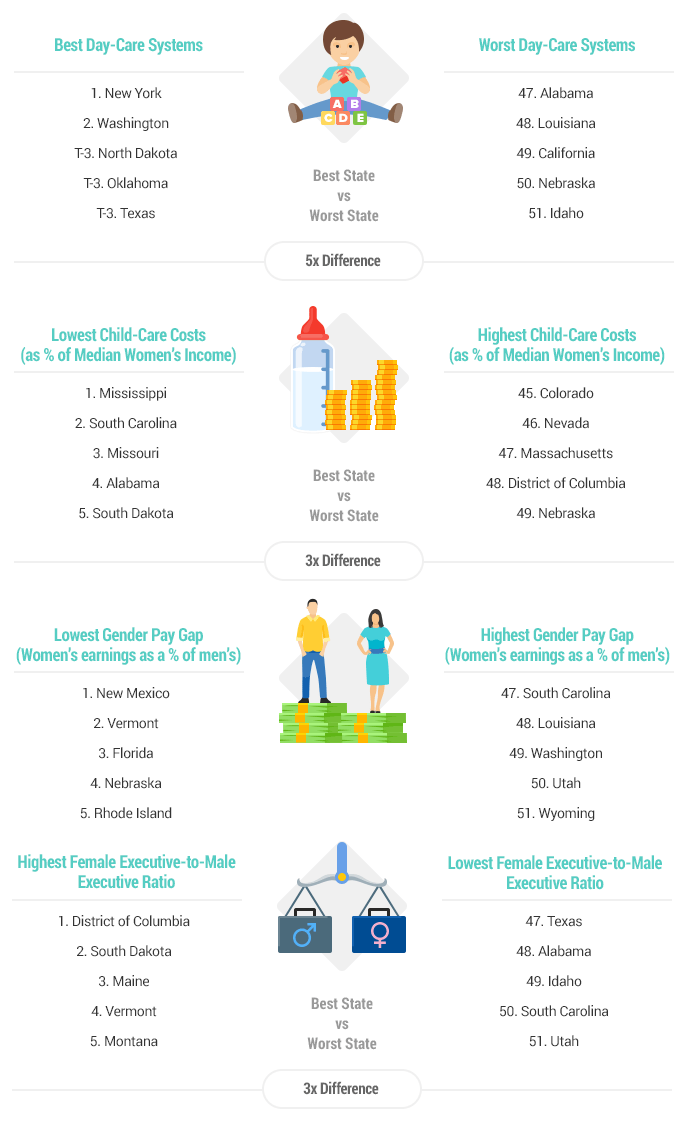The Best And Worst States To Live In For Working Moms

Motherhood doesn’t look the same as it did in the past.
Yet, in 2019 women are still being forced to choose between being a great mom and having the career they want. Trying to be an active parent is hard enough, but worrying about affordable child care, good school systems and work-life balance can make things tougher.
These aren’t just professional and financial problems that women have to deal with on a personal level, but rather speaks to deeper social issues in the United States. Wallethub is a personal finance website based in Washington, D.C., that offers free credit reports and access to robo financial advisors for their users. Wallethub completed a full breakdown of 16 aspects of motherhood in all 50 states to understand which has the best laws and policies for working moms to thrive.
On a macro level, the study ranked every state on child care, professional opportunities and work-life balance. The top five states for working moms from best to worst are Massachusetts, Rhode Island, Connecticut, Vermont and District of Columbia.

Main findings: Where all 50 states rank, with 1 best the best
Source: WalletHub
Here are a few noteworthy findings from the study:
- Blue states are more friendly and accommodating for working moms – the average ranking for red states is 17 while the average ranking for a blue state is 32.
- Nebraska ranked #1 for professional opportunities but falls at an overall ranking of 17 on the list.
- There is a 5x difference in the quality of child care in states with the best and worst daycare systems
- There is a 3x difference in costs between states with the highest and lowest child-care costs.
- There is also a 3x difference between the states with the highest and lowest female to male executive ratio.


How did they determine each state’s ranking?
As previously stated, Wallethub judged each state based on three dimensions: child care, professional opportunities, and work-life balance. They then broke down the three dimensions into 16 metrics, giving weighted points for each. Each metric was evaluated on a scale of 100 points, and determined each state’s weighted average across all metrics to find its overall score and then used those resulting scores to rank-order the sample.
In addition to an in-depth analysis of the aforementioned dimensions, Wallethub interviewed a panel of experts in a variety of occupations to give their perspectives. Although all of the experts work in academia, areas of specialty range from labor and employment relations to sociology and business. What did the experts say?
How Employers Can Help Parents With Work-life Balance
“Companies should set up work-family (work-life) friendly policies and programs (e.g., flexible work hours, parental leaves, part-time work options, reduced work arrangements, etc.) if they do not have one. Also, companies should make employees aware of the availability of the policies and programs so that they can utilize them, as well as to ensure that there are no negative career consequences of using the policies/programs. For example, PepsiCo Australia and New Zealand asked the executive team to “leave loudly” to ensure that when they leave the office early for family reasons, they declare it to their employees (e.g., “I’m going to pick up my kid”). The idea is that if it’s ok for the bosses, then it is fine for managers and other employees to do the same, and this gives a sense of psychological safety.”
YoungAh Park, Ph.D. – Assistant Professor, University of Illinois, School of Labor and Employment Relations
What Determines Which States Are Best For Working Moms?
- Secure jobs that pay a living wage.
- Right-to-request legislation (Vermont and New Hampshire).
- Paid family leave (Washington D.C., California, New Jersey, Rhode Island, New York).
- Good-quality, affordable childcare.
- High quality public schools from pre-k through high school.
– Jeremy Reynolds, Ph.D. – professor of sociology at Purdue University
State And Local Government Support For Moms
“Working mothers need to have quality, affordable care for their children. State and local governments need to consider investing in childcare just as they invest in economic development as the two are tied together. It is common to hear about tax cuts and incentives for businesses in retail or manufacturing, but not for the business of child care. Incentives to open or expand child care centers in high need areas would help. Providing more subsidies to child care providers would help to make quality care more affordable to working mothers.”
– Kerri J. Wade, MSW, LGSW – Extension Agent, Associate Professor, Assistant Director – Families and Community Development Unit, West Virginia University Extension Service
What Working Moms Want from Employers and the Government
“Child care is key and so is flexible scheduling. Also, we need to expect similar childcare roles of working dads and support them with paternity leave, etc. so we start to shift our thinking that the responsibility lies solely with the mother.” – Mary Everheart, startup founder, New York
“As a working mom with a 16-month-old son, I found it a bit hard to wrap my brain around leaving my baby after he was born to return to work. I had to use my PTO days along with FMLA days which I thought was unfair. I would say that moms should be granted at least a few weeks of paid leave even if they only receive half pay without having to use their own days in conjunction with that. Also, I was fortunate enough to have disability insurance that covered me because I was high risk so I had to take off work nearly two months earlier than my due date. My insurance helped tremendously but moms who don’t have that insurance aren’t as fortunate. Therefore, I feel that financial assistance should be provided to moms who have to take off work earlier or even after birth for medical reasons. My son is now in daycare and it has been hard for me because quality daycare isn’t easy to find and the daycare costs per month are draining on a household. I feel that organizations and the government should strive to provide quality daycare for working moms at affordable rates.” Marquita Ezell – Teacher, Alabama
“Affordable childcare is the biggest issue. It can determine what jobs you take or can’t take. Also, depending on how much you make, you won’t be able to get government assistance to subsidize it. The max amount for help is around$25k. This leaves women/families prone to making rash decisions because they can’t afford not to otherwise. For someone like myself who makes well over $25k, I’m unable to get the help which doesn’t factor in my household expenses, commute, or student loans. You either have to be impoverished to get help or wealthy with the means to afford all things. Those of us in the “middle” are denied. One big thing is finding an inclusive environment when working. I’ve been at places where everyone had a dog and not children. They have policies to bring your animals to work – that bark and take of space – but don’t offer the same on-site childcare facilities. It makes me feel like they value animals over human life. Ayana Gibbs – communications professional, New Jersey
Women make up almost half of the workforce and the majority of women who have young children contribute to that population. Ensuring that women have the resources to succeed at work and home is key to a truly modern society. About one in four women are raising children on their own, which makes some of these issues even more stressful for many. We’ve come a long way from the days when being a homemaker was one of a woman’s only options in life but we still have a long way to go as a society to help women be successful in all of life’s arenas.





